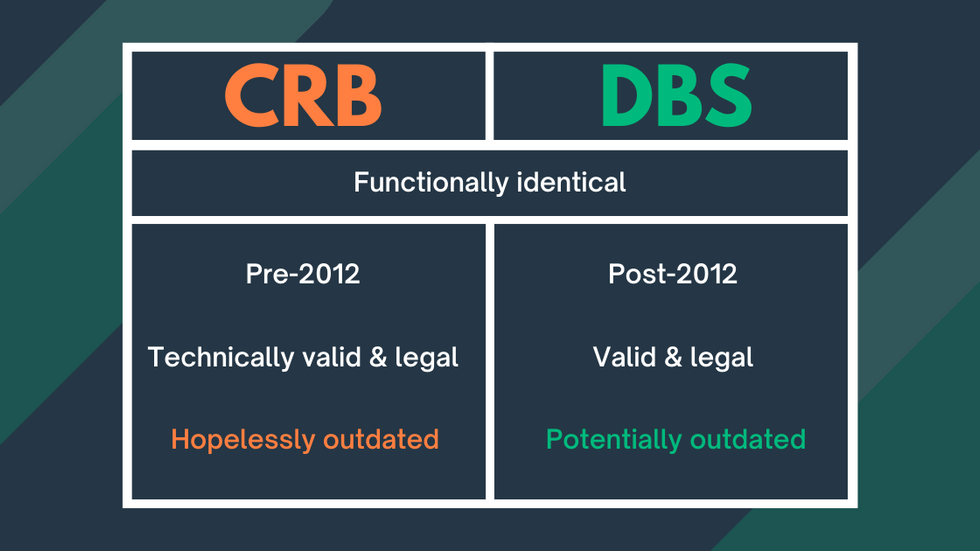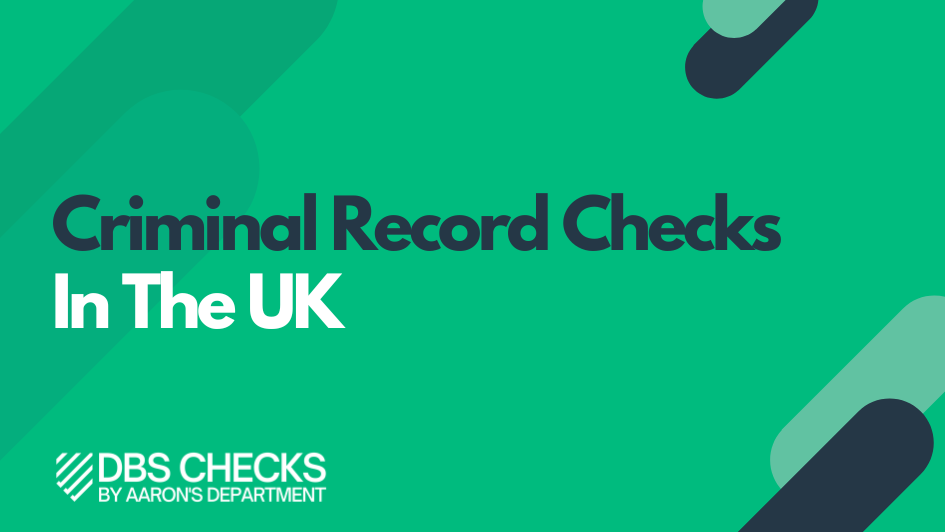When it comes to conducting a criminal record check, there are a few different options available to you, depending on your needs, location and the purpose of the check. In this article, we’ll cover some of the most common options, as well as the services we offer here at Aaron’s Department.
Disclosure and Barring Service (DBS) Check
The most comprehensive type of criminal record check in the UK is the Disclosure and Barring Service (DBS) check. This check is typically used for employment purposes or for volunteering with vulnerable populations. There are three levels of DBS criminal record checks available, (The Enhanced check is offered with or without access to the Barred List) depending on the nature of the position you are applying for.
- Basic DBS Check: This check only shows unspent convictions. Anyone can request this tier of check, only employers may request the higher tiers.
- Standard DBS Check: This check will disclose any convictions – spent and unspent – cautions, reprimands, or warnings that an individual may have.
- Enhanced DBS Check: In addition to the information disclosed in a standard DBS check, an enhanced DBS check will also include any relevant information held by local police forces or other agencies.
- Enhanced DBS Check with Barred List Check: This check includes all the information of an enhanced DBS check, as well as a check against the DBS Barred Lists, which list individuals who are barred from working with vulnerable populations.
DBS criminal record checks are by far the most common in the UK, as they are used in England, Wales, the Isle of Man, and the Channel Islands. Here is a link to the government webpage for DBS checks.
The table below shows the different information that is shared at each level of a DBS check:


PNC Check
You may have heard the phrase ‘PNC check’ before. ‘PNC’ stands for the ‘Police National Computer‘, and it’s the name of the database that holds much of the UK’s criminal record data. A PNC check is an important part of every DBS check, but it cannot be requested on its own. If you want to see your own criminal record without paying for a DBS check, however, consider using a Subject Access Request.
How Can I Check Myself For Criminal Record?
If you wish to obtain a copy of your own criminal record, you can submit a subject access request (SAR) to the organisation that holds your information. This option is available as part of your right to obtain information held about you under the Data Protection Act 1998. You can do this here. Subject Access Request
Disclosure Scotland Checks
In Scotland, the equivalent of a DBS check is called a Disclosure Scotland check. Disclosure Scotland is the government agency responsible for processing requests for criminal record checks in Scotland. Like DBS checks, there are different levels of Disclosure Scotland criminal record checks available, depending on the nature of the position an individual is applying for.
There are three types of Disclosure Scotland criminal record checks:
- Basic Disclosure – this provides a summary of an individual’s unspent convictions and is available to anyone.
- Standard Disclosure – this is typically used for employment purposes and includes details of both spent and unspent convictions, as well as any cautions, warnings, or other relevant information held by the police.
- Enhanced Disclosure – this is used for positions that involve regular contact with vulnerable groups, and includes all the information of a standard disclosure, as well as any additional information held by local police forces or other agencies.
It is worth noting that while DBS checks and Disclosure Scotland checks serve the same purpose, they are separate processes and are not interchangeable between Scotland and the rest of the UK. If you need a criminal record check for a position in Scotland, you will need to apply for a Disclosure Scotland check. Here is a link to the government website for Disclosure Scotland checks.
AccessNI Checks
In Northern Ireland, the equivalent of a Disclosure and Barring Service (DBS) check is called an AccessNI check. AccessNI is the government agency responsible for processing requests for criminal record checks in Northern Ireland. Like DBS checks and Disclosure Scotland checks, there are different levels of AccessNI checks available, depending on the nature of the position an individual is applying for.
There are four types of AccessNI checks:
- Basic Check – this provides a summary of an individual’s unspent convictions and is available to anyone.
- Standard Check – this is typically used for employment purposes and includes details of both spent and unspent convictions, as well as any cautions, warnings, or other relevant information held by the police.
- Enhanced Check – this is used for positions that involve regular contact with vulnerable groups, and includes all the information of a standard check, as well as any additional information held by local police forces or other agencies.
- Enhanced with Barred Lists Check – this is similar to an enhanced check, but includes a check against the Barred Lists, which list individuals who are barred from working with vulnerable groups.
It is important to note that AccessNI checks are only available to employers or organisations that are registered with AccessNI. If you are an individual who needs a criminal record check for personal reasons, such as for immigration or visa applications, you may need to apply for a Basic Check. If you are an employer or organisation that needs to conduct criminal record checks in Northern Ireland, you will have to register with AccessNI and follow their procedures for obtaining a check. Here is the government website for AccessNI checks.
CRB Checks
The Criminal Records Bureau (CRB) check was a type of criminal record check used in England and Wales until 2012, when it was replaced by the Disclosure and Barring Service (DBS) check. The CRB check provided information on an individual’s criminal history, including spent and unspent convictions, cautions, warnings, and reprimands.
In 2012, the Protection of Freedoms Act was introduced, which led to the creation of the DBS. The DBS check replaced both the CRB check and the Independent Safeguarding Authority (ISA) check, which was used for positions involving contact with vulnerable groups.


Conclusion – Criminal Record Checks
Conducting a criminal record check is an important step in ensuring the safety and well-being of those you serve or employ. With the different options available to you in the UK, it is important to make sure you’re getting the appropriate check for your intended purpose and region of the country.
The consequences of not conducting the necessary criminal record checks on yourself or your employees can be severe, so it’s a subject worth paying attention to!


What is the Role of Aaron’s Department?
Aaron’s Department is a DBS Umbrella body providing DBS Online Disclosures (DBS) to organisations, businesses, and employers in the public, private and voluntary sectors. Obtaining a Basic, Standard or Enhanced Criminal Record check UK (DBS check) helps identify candidates who may be unsuitable for certain work, especially that which involves children or vulnerable adults.
You can register for free using the buttons below, or contact us at contact@aaronsdepartment.com. We can answer any questions you may have.
About The Author


John Schofield-Antoncich
John has processed more applications than days he has been alive, and has become the DBS expert. Got a question? He knows the answer!
